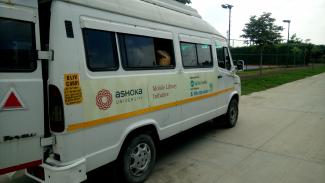
Rangashri Kishore, Dean of Library Services in Andhra Pradesh, talks about her unique initiatives and rehabilitation centres for the mental health cause.
You are a Dean of Library Services at Krea University, Chittoor, by profession and also a mental health worker by avocation. Which aspect of mental health has been your area of concern?
Mental Health is one of the most neglected aspects of health. Schizophrenia and other disorders such as bipolar disorder can be difficult to manage in family situations. In India, one percent of the population is affected by one or the severe mental illnesses and there are only approximately 3000-4000 psychiatrists in the country. When it became apparent that it was starting to get difficult to manage my brother M.A. Srivatsa, who suffered from this illness from the year 1986, at home, my family and I started seeking help. I got married the same year when he was diagnosed. In 1991, I even knocked on the doors of Mother Teresa who helped me admit him in Kolkata. After that we had to take him to NIMHANS as recommended but there was lack of any support post hospitalization such as a half way home. While I was in NIMHANS with my brother for his treatment Dr Ranganathan, Prof of Psychiatric Social Work, helped me understand the nature of these illnesses and mentored me to accept the reality of his illness and made me realize that I was not alone. It is then with his help I was able to get associated with many other families and started the Family Fellowship Society for Psycho-Social Rehabilitation in Bangalore in (1991), VISHWAS Richmond Fellowship Society India Delhi Branch (1997) and Anand Rehab Centre in Mumbai along with Mr Goplakrishna (2000).
You have received several awards for your work especially for training persons with chronic mental illness in managing libraries. Please could you elaborate?
One of the aspects of this illness is that patients like my brother are very intelligent. With medication and counselling they can be functional. After having initiated half way homes or rehabilitation centres, it occurred to me that since I was a Librarian maybe I could start training persons with mental illness as a part of their rehabilitation efforts.
Related Reading: Value of Jobs for Persons with Mental Illness
I taught them to manage Libraries and helped them learn some basic skills in computers and also processing of books like stamping and labelling. Some of them later picked up jobs as School Librarians.
What are the pros and cons of training persons with chronic mental illness in managing libraries?
On one hand it helps them to learn a skill which can fetch them a job which is not stressful. On the other hand it is also important to make other people working in the organization with them to understand that they may need some accomodations. The HR should be sensitized to make other people in organization accept their condition and limitation and give the necessary encouragement for their improvement. There are challenges of helping them to get employment.
Related Reading: Employment Gives Dignity and Rehabilitates Persons With Mental Illness
How successful has this initiative been?
In the initiative that I took on it has helped some of the patients to learn and skills necessary to become a school Librarian. They also are able to spend time reading newspapers and books while at work. The feeling of empowerment due to productive employment helps them to slowly overcome their mood swings.
You have co-founded three half-way homes, one each in Bangalore, Mumbai and Delhi. Who are they for and what are their activities?
Half way homes are those that helps patients to get support in a residential environment. After hospitalization, and before going home the family and the individual get holistic support of vocational training, counselling, medication and rehabilitation. Mostly service users are housed for 18 months or can be discharged earlier depending on the treating doctor’s advice. These organizations also reach out to the community through outreach efforts where a Psychiatrist is providing free services to the rural populations from the Primary Health Care Centres.
You have been part of various global mental health teams for research, advocacy and education. What have been your major takeaways from there?
I have been a part of the Global Mental Health Team of the EMPOWER project which was funded by Welcome Trust of London School of Hygiene and Tropical Medicine and where I presented our work at the Global Mental Health Meet in Cape Town, 2011. They selected four caregivers from the world and I was selected to represent India. The caregivers from Nepal, India, Kenya and Zambia were given an assignment to develop advocacy materials in their own setting and I developed multimedia presentations and posters in three languages in research methodology. Lesson learnt was that the problems and challenges of caregivers across the globe is identical.
In addition, I have assisted the Communication division in proposal development and conduct of programmes in Mental Health and got support from Government of India for five states. I was also a part of the Senior Management Group of the South Asia Hub for Research, Advocacy and Education (SHARE) project for mental health in Public Health Foundation of India.
On July 31st, we formally registered the Srivatsa Memorial Trust for Mental Health to support programs to help mental health patients, caregivers and families.






